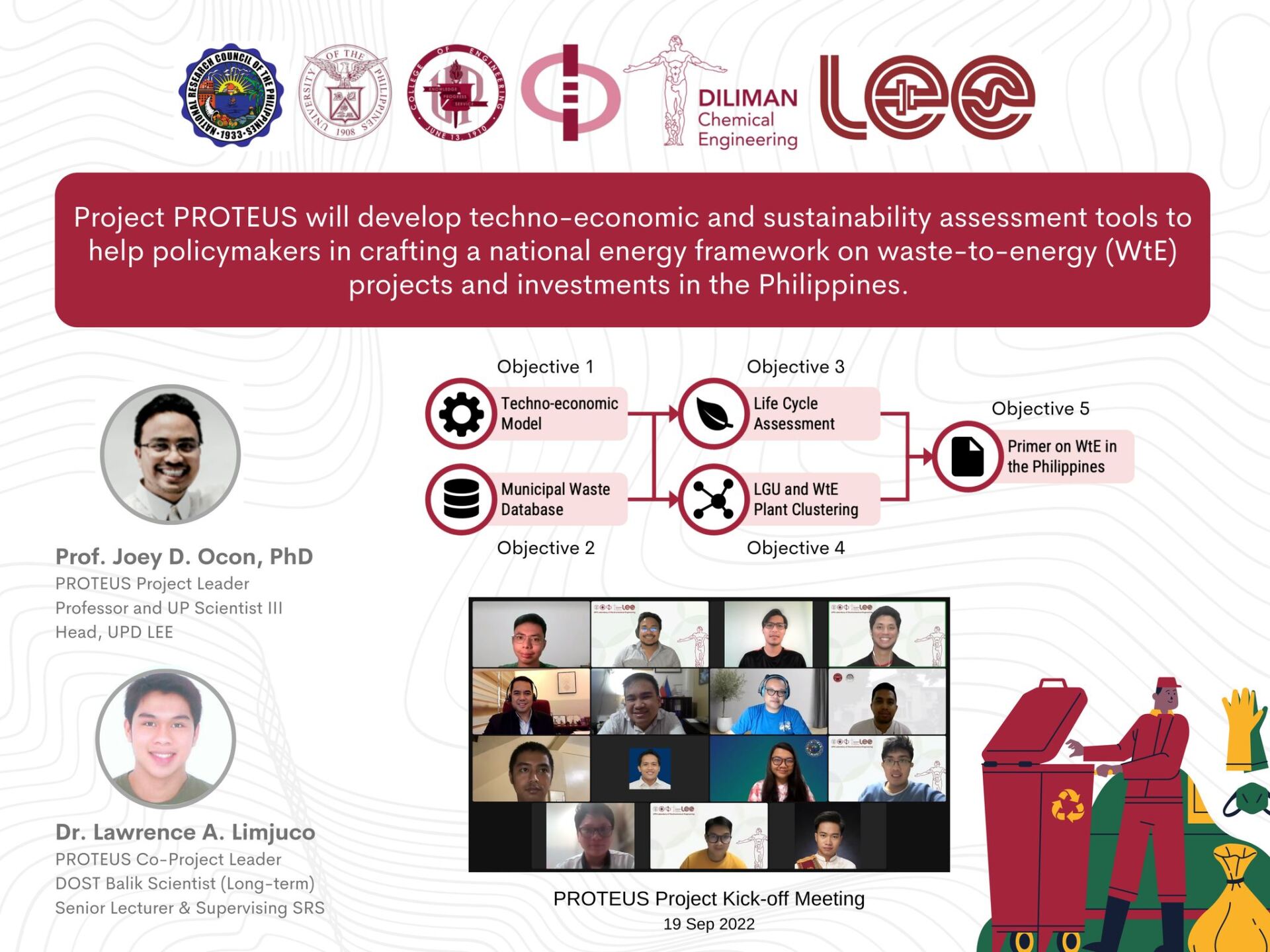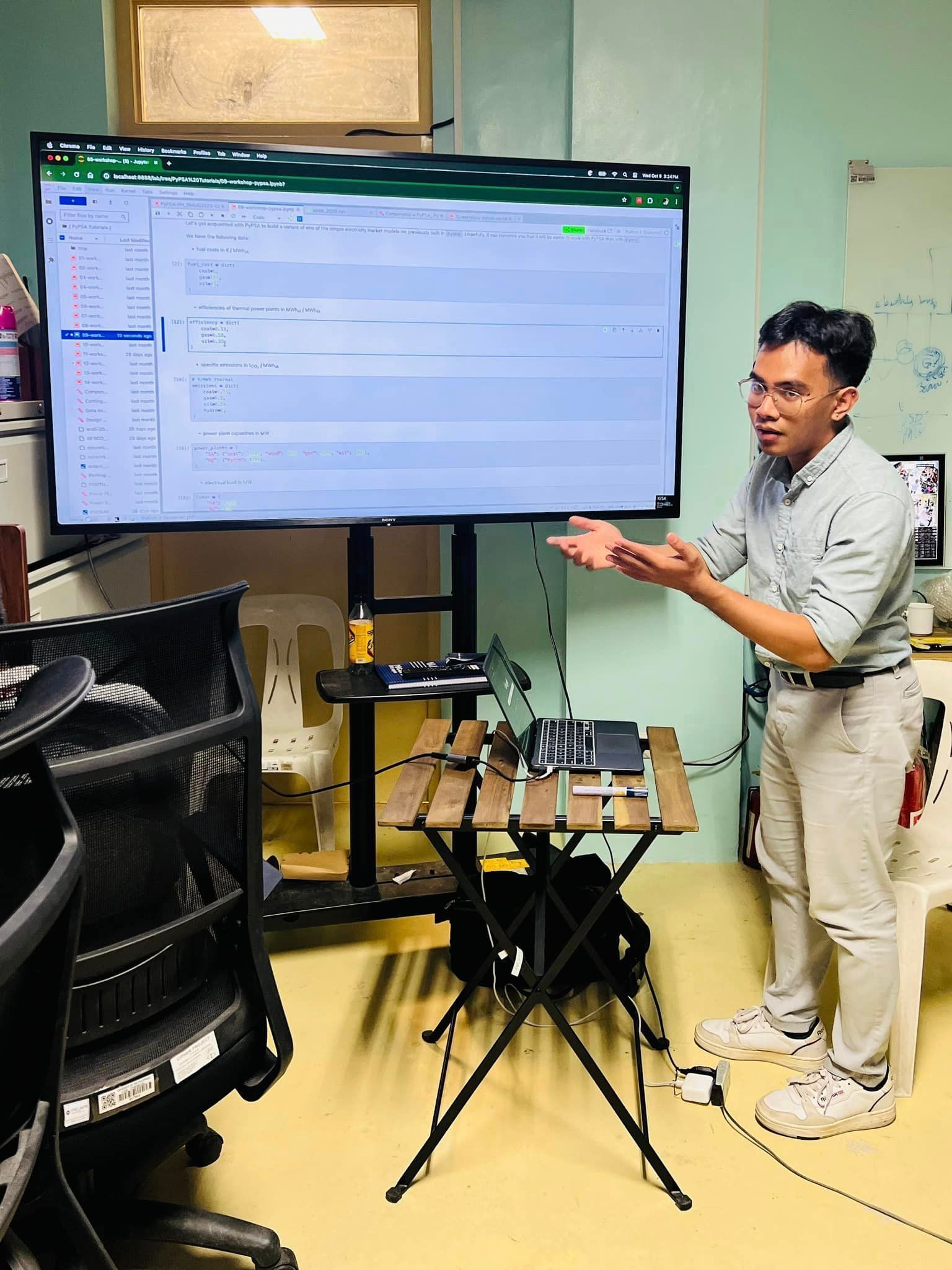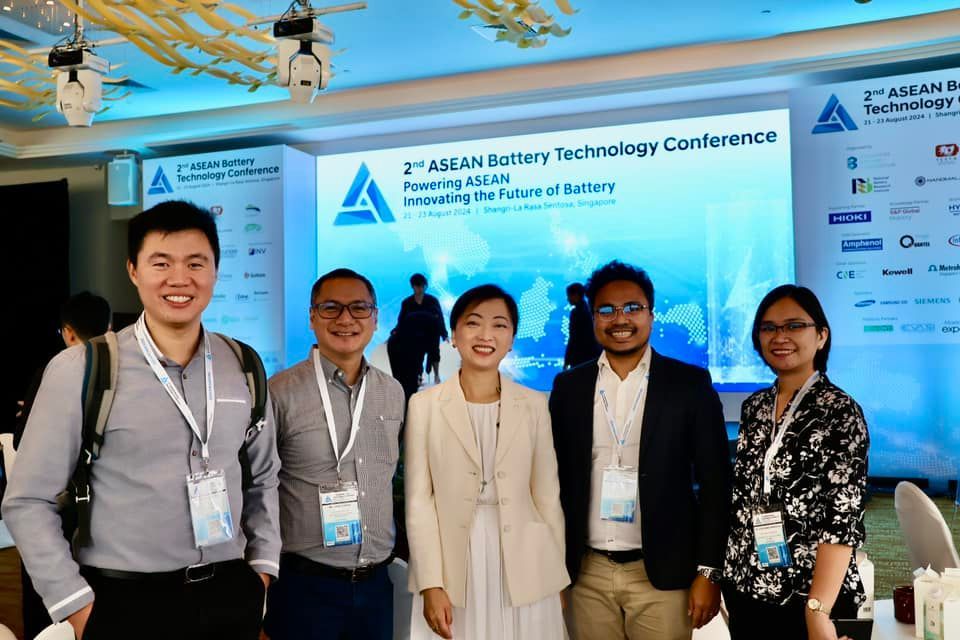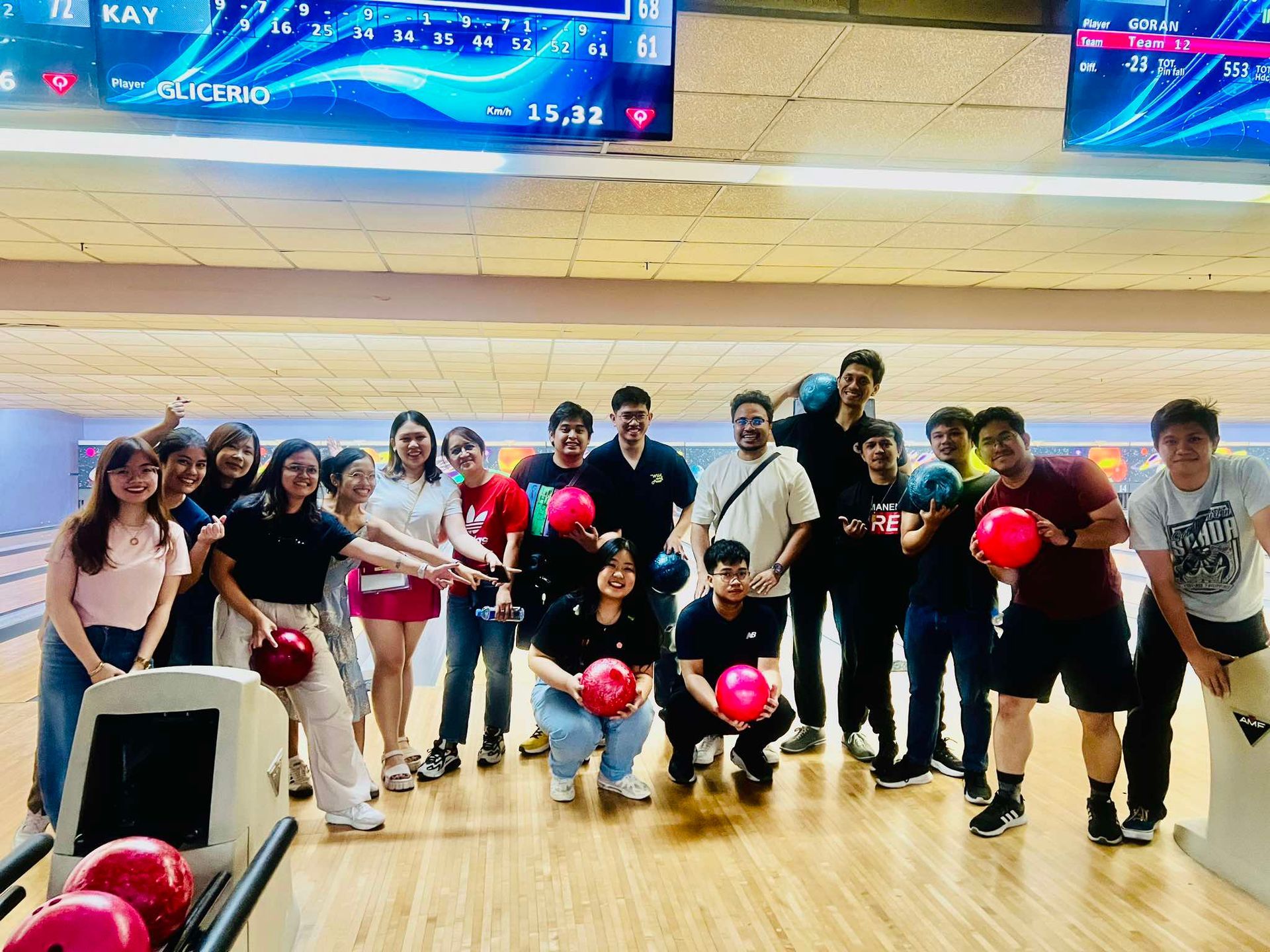Prof. Ocon and Dr. Limjuco secure a new waste-to-energy policy R&D project
September 1, 2022

The Department of Science and Technology – National Research Council of the Philippines (DOST-NRCP) recently approved a new project entitled “PROTEUS: Policy R&D on Optimization, Techno-Economics and sUStainability of Waste-to-Energy in the Philippines” that will be implemented by the Laboratory of Electrochemical Engineering (LEE) of the UPD Department of Chemical Engineering.
Led by Prof. Joey D. Ocon, Ph.D. and Balik Scientist Lawrence A. Limjuco, Ph.D., Project PROTEUS aims to develop techno-economic and sustainability assessment tools to help policy-makers in crafting a national energy framework on Waste-to-Energy (WtE) in the Philippines. Project PROTEUS (PhP 4.5 million funding) is the first NRCP-funded project of the department focused on energy policy R&D. Being a policy-oriented project, the multi-disciplinary team will engage multiple stakeholders (e.g. Congress, Department of Energy, etc.) aside from the academic researchers. The project name is inspired by the Greek mythology sea-god Proteus, knowing that each year billions of wastes end up in the world’s oceans and rivers.
Along with research publications, Project PROTEUS aims to construct a primer and policy brief in WtE and coordinate with government agencies such as Congress on these policies. This document will be based on the G-PESTLE framework (Geographical, Political, Economic, Social, Technological, Environmental) to ensure a holistic assessment and approach to WtE projects. Furthermore, Project PROTEUS aims to extend the functionalities of the Island Systems LCOEmin Algorithm (ISLA). ISLA, LEE’s in-house energy systems modeling tool, can be extended by adding a module for WtE technologies and integrating the corresponding resource database from the municipal solid waste which acts as the fuel. Optimal WtE plant/s deployment and clustering of LGUs for waste collection can be simulated using ISLA. In addition, the techno-economic model and dataset will then be utilized to conduct financial studies on the effect of incentives and tipping fees on the profitability of WtE plants and life cycle assessment (LCA) studies on the environmental impacts of the plants.
To aid in the realization of the aforementioned goals, the project hired three (3) senior science research specialists and one (1) project development officer. A multidisciplinary team of experts from UP and DOST will co-supervise the research activities of the science research specialists, including Prof. Analiza Rollon, Ph.D., (DChE, UPD), Assoc. Prof. Mikhail Jhud Aberilla, Ph.D., (DChE, UPD), Atty. Paul Heherson Balite (TMC, UPD and Congress-HOR), Assoc. Prof. Manolito Bambase, Ph.D. (UPLB), Dr. DJ Donn Matienzo (DChE, UPD), Asst. Prof. Michael Castro (DChE, UPD), and Mr. Jan Goran Tomacruz (Instructor, DChE, UPD).
“We are grateful to the NRCP for approving the Project PROTEUS. Not only will the project capacitate and motivate budding researchers, it will also provide an avenue to address the persistent environmental problems on the country’s mismanaged solid wastes and repercussions of increasing energy demand. Surely, there is still a lot of room for discussion for the deployment of WtE technology in the country. We are hopeful that the Project PROTEUS can provide science-based data and local-based tools for the holistic evaluation of WtE in the Philippines and, consequently, help and guide our policymakers in crafting a national energy framework on WtE in the Philippines,” said Dr. Limjuco, the Co-Project Leader.
NRCP is an attached agency to the Department of Science and Technology and is an advisory body to the Philippine Government of matters of national interest. NRCP promotes and supports fundamental or basic research, including policy R&D researches identified by government agencies, such as Congress.
The year-long project officially started last September 2022.

LEE research staff and graduate students participated in an in-house training and workshop on the Python for Power Systems Analysis (PyPSA) toolbox on October 9 and 23, 2024 . The sessions were led by Arizeo Salac (SRS 1, ElectriPHI), who returned from a six-month research sandwich program at the Reiner Lemoine Institute in Berlin, Germany , where he focused on data-driven decision-making and energy systems modeling. The training included a detailed discussion on energy systems modeling, with key topics such as data sources and the representation of energy systems using both conventional and renewable technologies. Participants received hands-on assistance with the software setup and installation, followed by simulation activities that showcased PyPSA’s capabilities in energy and power systems analysis. Mr. Salac also presented his baseline model of the Philippine energy system, which can be utilized for energy transition scenario planning. The event aimed to enhance participants' proficiency with open-source modeling tools, share best practices in modeling, and support their research in energy systems. Article by: Sophia Lunor

Prof. Joey D. Ocon, Dr. Julie Anne D.R. Paraggua, Dr. Lawrence Limjuco, and Giancarlo Sanglay were among the Filipino delegates at the 2nd ASEAN Battery Technology Conference , held from August 21 to 23, 2024 , at the Shangri-La Rasa Sentosa in Singapore. Themed "Powering ASEAN: Innovating the Future of Battery," the event was co-organized by key ASEAN associations from Singapore, Thailand, Indonesia, Malaysia, and the Philippines. They were accompanied by LEE member and graduate student, Giancarlo Sanglay and NextGen Project Chief Technical Specialist, Dr. Lawrence Limjuco, of the Advanced Batteries Center. The conference aimed to foster connections among researchers, engineers, and industry stakeholders within the battery and electric vehicle (EV) sectors. It provided a platform for knowledge exchange, technical discussions, and potential collaborations. Key topics included the development of the Battery and EV Roadmap for Southeast Asia, as well as government policies and regulations surrounding battery and energy storage systems (ESS) applications. Industry leaders and academic experts also addressed technological advancements in battery materials, financial support for innovations, and strategies for managing the end-of-life value chain of batteries. Prof. Ocon, who also serves as Co-Founder of Nascent Batteries, played an active role in the event by moderating a panel discussion on advancing ESS technologies in Asia. The panel featured representatives from prominent organizations, including EDP Renewables APAC, Green Tenaga Pte Ltd, and the Electricity Generating Authority of Thailand. This collaborative event underscored the region's commitment to advancing sustainable energy solutions and highlighted the critical role of ASEAN countries in driving innovation within the battery and EV industries. Article by: Lora Monique Sapanta

The Laboratory of Electrochemical Engineering (LEE) held a despedida party to bid farewell to two of its active members — Ms. Rosela Lazaro and Asst. Prof. Michael Castro — as they embark on a new chapter of their academic journey. The LEE members, along with their laboratory head, Prof. Joey D. Ocon, celebrated through a friendly competition at the Ever Gotesco Bowling Alley, Commonwealth Avenue last August 19, 2024. This also fostered camaraderie and strengthened the bond and friendship between the lab members. Ms. Lazaro will be studying MS in Environmental Science and Engineering at Gwangju Institute of Science and Technology, South Korea. Meanwhile, Asst. Prof. Castro will be pursuing a doctorate degree in Nuclear Engineering and Management at the University of Tokyo, Japan. He will be returning to UP Diliman to tend to his duties at the Department of Chemical Engineering. Indeed, ‘goodbyes’ are not the end. It marks a beginning of a new ‘hello’, a step closer to making dreams come true. To Sir Michael, ganbatte! To Sela, hwaiting! We are all rooting for you both! Article by: Lora Monique Sapanta


